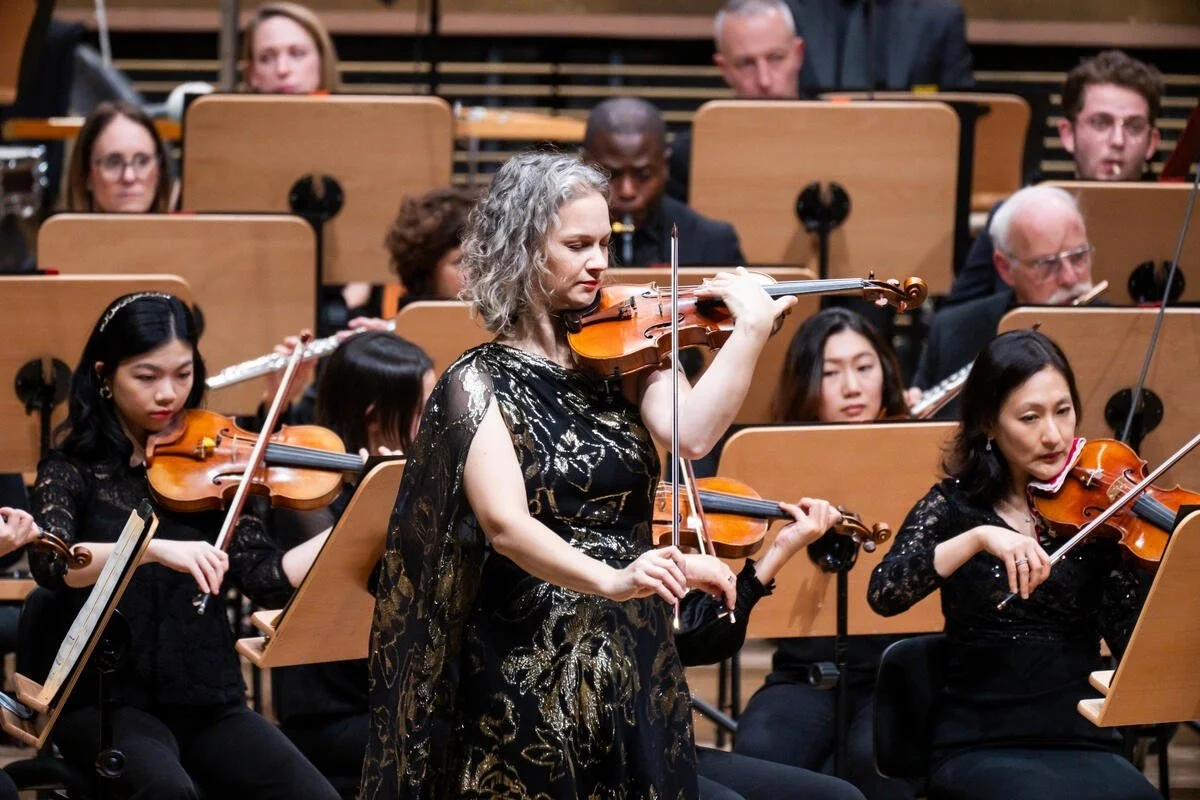REVIEW: Hilary Hahn Soars With New York Philharmonic
Above photo by Chris Lee.
January 13, 2024
Jakub Hrůša conducted the New York Philharmonic this week in a program that featured violin soloist Hilary Hahn being awarded the Avery Fisher Prize. The hall (and lobby, where the NY Phil concerts can now be seen and heard) was impressively full on Saturday night — the last of three concerts featuring this busy superstar of the violin world as she joins the Philharmonic as Artist-in-Residence for the 2023-24 season.
British composer Samuel Coleridge-Taylor’s Ballade for Orchestra in A Minor, Op. 33, composed in 1898, alternates between a “Ride of the Valkyries” squall, and a swooning lyrical theme that would serve nicely as a pas de deux in a Tchaikovsky ballet. Hrůša, an elegant Czech conductor and Music Director Designate of Covent Garden, jolted the audience to attention with a swift, driving tour through this tuneful showpiece. We lingered fleetingly to smell the roses in the second theme, but moved along before its sweetness became cloying.
Coleridge-Taylor’s Edwardian entertainment anticipates Béla Bartók’s Concerto for Orchestra — which concluded the evening — placing the various sections of the orchestra on display. Battle-ready horns and energetic woodwinds found some especially gratifying moments in the Ballade. Hrůša appeared primed to test and harness the new Geffen Hall’s acoustics, carefully guiding orchestral balances — I wondered if an uncharacteristically gaunt brass sound was due to over-pruning, or the limits of the writing.
Photo by Chris Lee.
Hrůša’s ear for balance, and skill as accompanist, meshed well with Hahn’s virtuosity in Sergei Prokofiev’s Violin Concerto No. 1 in D Major, Op. 19. One of Prokofiev’s most vivid and colorful scores, the first violin concerto (penned in 1917) plays well to Hahn’s varied strengths — chock-full of windswept chromatic zing, yet essentially lyrical and singing. But it requires surgical management of orchestral textures to allow the solo part to float. (“Not too much, tuba!”) And Hahn not only floated, but soared, in this idiosyncratic work that she recorded in 2021.
The first movement, progressing from a mysterious melody high in the solo violin that instantly blossoms into a heady dialogue with strings and woodwinds, to a bracing jaunt through stinging and dramatic effects, is early proof of Prokofiev’s greatness — nothing feels obvious. When the opening melody returns in solo flute, Hahn dispensed the solo part’s muted, swirling decoration like fairy dust.
The team did not hold back from the acerbic Scherzo’s Vivacissimo tempo marking, but Hahn still managed to highlight the antic mischief in the athletic solo, while Hrůša kept the insistent accompaniment tightly tamped. The haunting, bittersweet third movement returns to lyrical territory. With a rich legato, Hahn passes lush, ruminative tunes to the orchestra, then comments spikily or ruefully. An encore of understated (and, like Prokofiev, deceptively difficult) Bach allowed Hahn’s glistening tone to be heard unencumbered.
Bartók’s Concerto for Orchestra is a vessel that allows the entire orchestra to soar. The somber first movement unfolded with remarkable clarity of detail. The second movement, “Game of Couples,” provides the Philharmonic’s players break-away moments in small ensembles, and you could hear the musicians delighting in the distraction of Bartók’s dark humor.
The ponderous middle movement, “Elegy,” balanced attention to detail with passion-infused heart, while the impish fourth movement, “Interrupted Intermezzo,” was dreamlike and ephemeral. It wasn’t until the impactful finale, when sweeping strings and a gaping sense of anticipation build to a life-affirming climax, that the Philharmonic brass section sounded fully like themselves. I have heard performances of the Bartók that churned more sonic impact, but rarely are the minutiae as clearly defined and integral to the whole.
Photo by Chris Lee.
***







